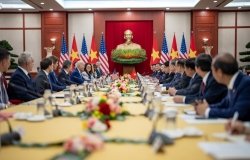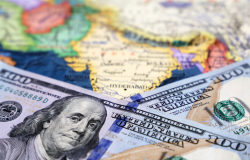Four men and one woman who have been imprisoned in Iran for years are on their way home as part of a prisoner exchange agreement that gives Tehran access to $6 billion in oil revenues previously frozen under US sanctions. USIP-Wilson Center Distinguished Fellow Robin Wright provides insights into how the negotiations happened, what pushed Iran to make this deal, and how the $6 billion will be administered. The deal comes after months of indirect talks mediated by Qatar, which began in February of last year.
Guest

Robin Wright
USIP-Wilson Center Distinguished Fellow;
Author and columnist for The New Yorker
Hosted By
The Wilson Center’s Middle East Program serves as a crucial resource for the policymaking community and beyond, providing analyses and research that helps inform U.S. foreign policymaking, stimulates public debate, and expands knowledge about issues in the wider Middle East and North Africa (MENA) region. Read more

Raimondo's China Trip Proves That Just Engaging Beijing Isn't Enough

The Indo-Pacific Region Needs a Comprehensive Digital Trade Agenda
By Alex Botting on September 15, 2023

China’s Role in Latin America, Santa Claus or Debt Collector?
By Facundo Robles on September 15, 2023

Ukraine Facility – The EU’s Chance to Take Leadership of Ukraine’s Economic Recovery
By Henri Winberg on September 13, 2023

The Comprehensive Part of the US-Vietnam Comprehensive Strategic Partnership
By Lucas Myers on September 12, 2023

US Leadership Still Critical for Asia
By Keith Rockwell on September 7, 2023

A Discussion with President of the Brazilian Senate, Rodrigo Pacheco

Assessing the Impact of AMLO's Energy Policies: Insights from Advisory Board Members and Global Fellows
By Earl Anthony Wayne on September 7, 2023

Russia’s Unprecedented War Budget Explained
By Boris Grozovski on September 7, 2023

Reinforcing America’s Chip Design Leadership: The Urgent Need for Innovation-Centric Policy Agenda
By Falan Yinug on August 30, 2023

Strengthening Economic Ties with Taiwan Means More Trade Deals